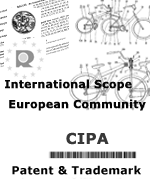| |
|
|
| |
|
 |
Intellectual Property Links |
|
|
|
► Facsimile:
+86 20 37884462 |
| |
|
 |
|
|
 |
 |
TRADE MARKS |
|
|
China Intellectual Property Agency
(H.K.) regularly counsels and represents clients on a full range
of trademark-related issues. Through counseling clients in the
registration and protection of trademarks and service marks, we
help our clients develop and manage trademark portfolios that
further advance their business goals. Our attorneys or agents
provide comprehensive counseling services including the
following: ►
Collaborating with our clients to
select trademarks and service marks for the names, logos and
designs of
their products and services;
►
Conducting and reviewing searches of
trademark databases , and counseling clients on nuances
concerning
use of their trademarks;
►
Regularly preparing and filing
trademark applications in the Chinese Trademark Office as well
as in foreign countries or regions including the United States
of America, Canada, Hong Kong, or Japan ,etc. thus enabling
our clients to obtain global protection of their marks;
►
Participating in opposition and
cancellation proceedings involving other trademark applications
and registrations. |
 |
|
|
►
Contact us to file
an Application of Madrid International Registration of MarK? |
The
Madrid system for the international registration of marks (the
Madrid system) established in 1891 functions under the Madrid
Agreement (1891), and the Madrid Protocol (1989). It is
administered by the International Bureau of World Intellectual
Property Organisation located in Geneva, Switzerland.
Thanks to the international procedural mechanism, the Madrid
system offers a trademark owner the possibility to have his
trademark protected in several countries(Members of the Madrid
Union) |
|
|
by simply
filing one application directly with his own national or
regional trademark office. An international mark so registered
is equivalent to an application or a registration of the same
mark effected directly in each of the countries designated by
the applicant. If the trademark office of a designated country
does not refuse protection within a specified period, the
protection of the mark is the same as if it had been registered
by that Office.
In order to apply for international
registration of your mark though the Madrid system, you have to
be a national of a member State of the Madrid Union or to have
either a real and effective industrial and
commercial establishment or a domicile in that country. |
 |
|
►
Contact us to file
an Application of European Community Registration of Mark? |
 |
A CTM(Community
Trade Mark)is a sign for identifying and distinguishing
goods or services valid across the European Community,
registered with the OHIM (Office for Harmonization in the
Internal Market)in accordance with the conditions specified
in the CTMR.The CTM Register is a database containing
particulars of all trade marks registered by the Office.
European Union currently has the following Member States
including:
Austria, Belgium, Cyprus,
Czech Republic, Denmark, Estonia, Finland, France, Germany,
Greece, Hungary, Ireland, Italy, Latvia, Lithuania,
Luxembourg, Malta, Poland, Portugal, Slovakia, Slovenia,
Spain, Sweden, The Netherlands, United Kingdom. |
|
|
The Register is constantly updated, to
take account of any change, such as a transfer of ownership, a
change of name or address, the granting of a license or a
security. A CTM application and a CTM are valid in the European
Community as a whole. The application and the ensuing
registration extend automatically to all 25 Member States of the
European Community indivisibly.
The procedure for the
registration of a CTM is an examination procedure which
comprises the following three main parts:
►
Firstly, examination of the
application, which includes whether or not a filing date may be
accorded, the formalities examination and the examination as to
absolute grounds for refusal, during which search reports are
established.
►
Secondly, publication of the
application.
►
Thirdly, the procedure up to
registration which may comprise opposition proceedings. |
|
|
|
|
|
|
|





